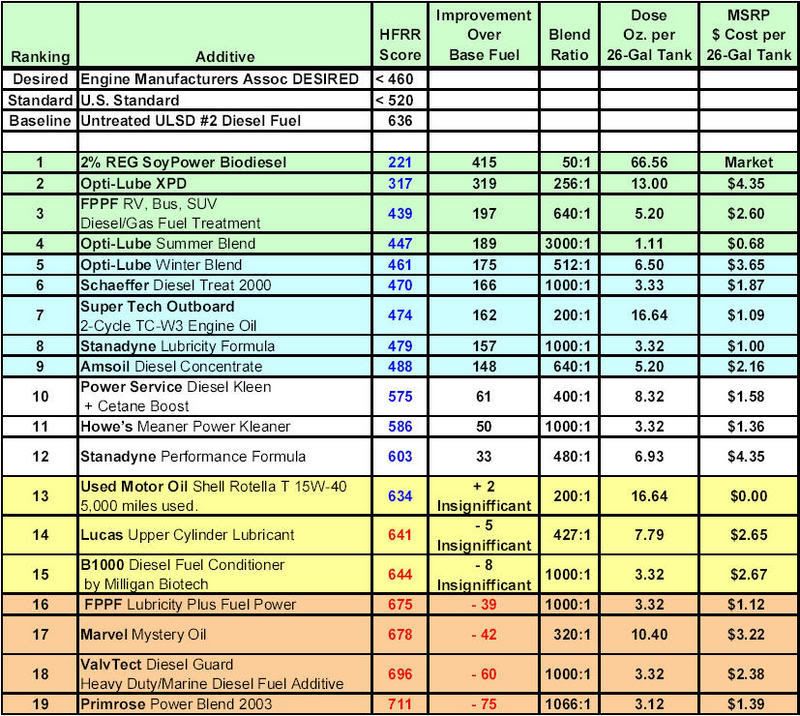Wait, my head is spinning at the moment. Is this to indicate that other hatteras owners are ALREADY adding 2-stroke oil to their fuel or some other additive? I've never heard of this.
I have been using tcw3 2 cycle oil in all my old diesels for probably 4 or 5 years now. Thanks to oscarvan for posting the entire results of the report, quite an interesting read, had never read the white paper that went with the chart.
So basically what led me to tcw3 is that I was using lucas, always had (my grandad did) and I wanted to do some research to see if it were necessary, doing any good...etc. I did some internet research, found several references to 2 cycle oil tcw3 being used as an additive and it being superior to lucas. Talked to a couple of 'old timer' injector shops (tractor and marine) and several other old timer diesel guys and all knew about using 2cycle oil and either recommended using it or at least use some other additive.
I used lucas and then 2cycle in my last boat which had cat 3208's and have used it pretty religiously in our 8v92's since purchase/rebuild.
I also use it in my tractor (Ford 3000) and occasionally in my Ford powerstroke 7.3.
I swear I can hear/feel the difference in the engines of all 3, my truck, my tractor and my boat when ran with/without the 2 cycle. All seem to quiet down and not have as much diesel 'rattle'. I do not think it affects performance in any way (at least that I can tell).
As to the question: Do these old detroits really need lubricity?
Need...? I mean these things will run off of pretty much anything you feed them. Some guys I know dump their old engine oil into the fuel tank after changing oil.... The question really should be will it increase serviceable life of them. I personally think that anything you can do to increase lubricity of a de-lubricized (did i just make up a word?) fuel will indeed increase serviceable life of the engine and fuel system.
If you look at the diagram of the detroit 2 cycle fuel injector, you will realize how many intricate moving parts there are to these things. The injectors perform 4 functions, they time, adomize, meter and pressurize the fuel. In modern diesels injectors perform half of these functions and some of them are controlled by electronic actuators.
Although these are just 'old detroits' they are actually extremely sophisticated examples of engineering.... You want roller bearings? Detroit got um! You want common rail fuel injection system? Detroit got it! The list goes on. Many items manufacturers of new diesel engines tout today are already on our old detroits. I can't tell you how many times I've heard an engine mfg boast 'common rail fuel injection' lately. pshhh we got common rail in WWII engines here.
I'd never suggest or recommend anybody do anything to their engine just b/c I do it. By all means do your own research, determine what is right for you. The one fact that we can all agree upon is that fuel today is not the same as it was when our engines were engineered. In fact it is quite different. What you do with that knowledge is completely up to you.
This pdf is a pretty good read, I keep a copy in my boat file for reference. Explains the detroit fuel injector in pretty good detail.
https://www.google.com/url?sa=t&rct=j&q=&esrc=s&source=web&cd=25&ved=2ahUKEwi55c_5n7jjAhXnYN8KHS3oC0oQFjAYegQIBhAC&url=http%3A%2F%2Fbusgreasemonkey.com%2Fuploads%2FFileUpload%2Fb8%2Fc6b33345182ddfb99f558ca4a29209.pdf&usg=AOvVaw1wlyKIM4tYHsqDjiVEvrqj


